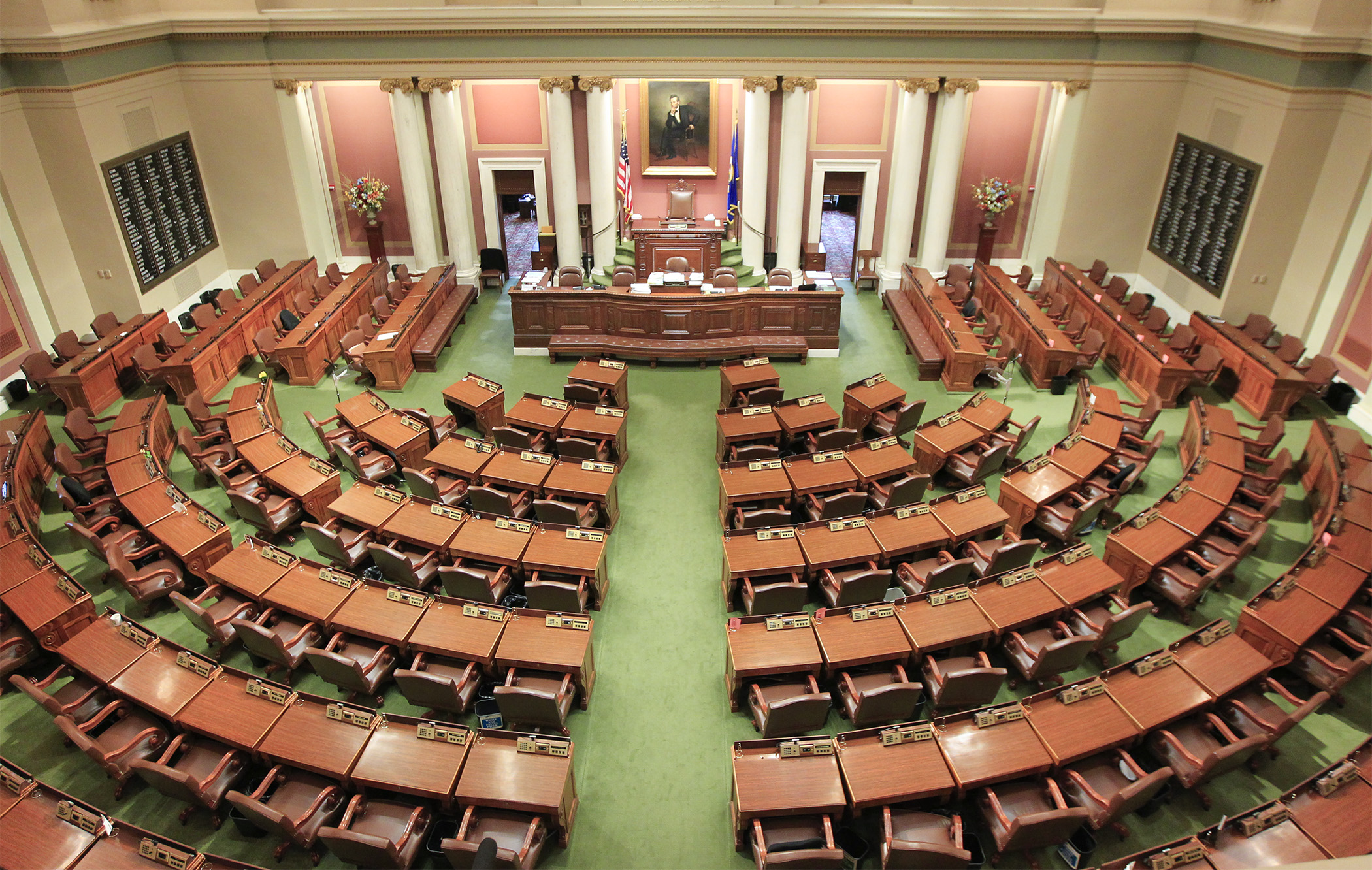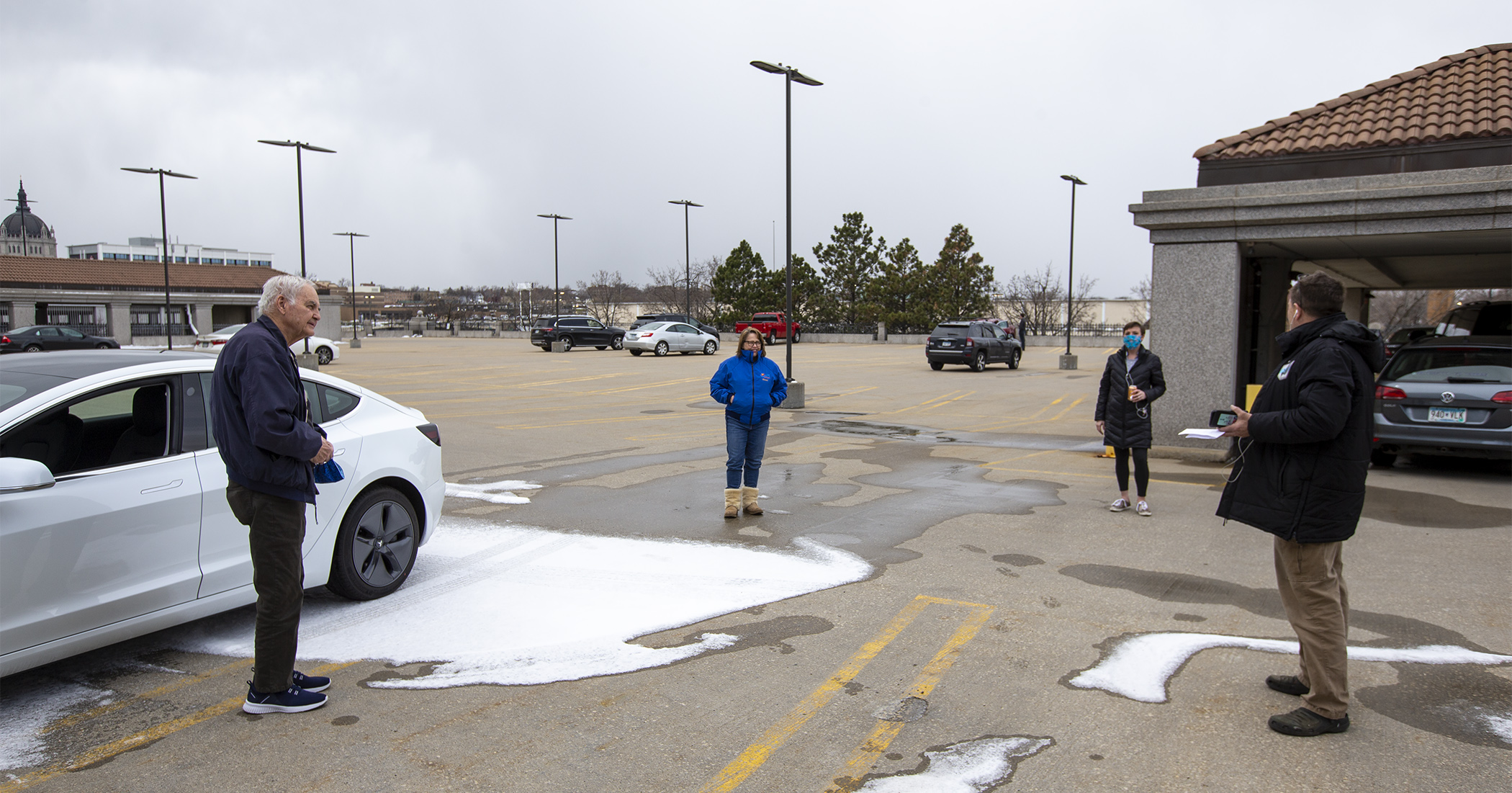Policy provisions take center stage in latest COVID-19 response bill

The House and Senate passed a package Tuesday afternoon to address a host of policy issues related to the COVID-19 pandemic in Minnesota.
HF4556, sponsored by House Majority Leader Ryan Winkler (DFL-Golden Valley), is the fourth piece of legislation passed by the House to address the COVID-19 pandemic. It contains many provisions discussed in remote meetings the previous week and addresses a range of issues including civil law, transportation, taxes, and health and human services.
Passed 103-31 by the House and 64-3 by the Senate, the bill now goes to the governor. Senate Majority Leader Paul Gazelka (R-East Gull Lake) is the Senate sponsor.
The bill would add an additional $1.25 million to a fiscal year 2020 appropriation to reimburse Second Harvest Heartland for the purchase of milk and protein products, including meat, dry legumes, cheese, and eggs.
It would also strengthen the Department of Health’s temporary emergency authority, allowing it to delay, waive, modify, or issue variances to some state laws, and providing related reporting requirements.
Rep. Steve Drazkowski (R-Mazeppa) unsuccessfully offered an oral amendment that would have removed a list of chapters which would be eligible for modifications, saying that any changes needed in those chapters should be clearly identified and brought to the Legislature directly.
“I see this provision, specifically these three lines, as very irresponsible for us to bring forward in the bill,” he said. “We are basically giving the authority to the executive branch to have full reign.”
Rep. Tina Liebling (DFL-Rochester) said that portion of the bill was negotiated by the four caucuses, included in an executive order, and that the bill already limits the Department of Health to actions necessary for preparing for, preventing, and responding to the COVID-19 pandemic.
“This is not just giving government the authority to just do anything and everything that they may want to do,” Liebling said. “During this emergency, it is necessary to give the department some flexibility … and not have to come back to the Legislature for everything.”
HF4556 would also allow the Health Department to establish temporary alternative health care facilities by suspending some compliance and regulatory standards to allow for nontraditional spaces to be used. Consultation on state building code issues would be required with the commissioner of labor and industry as needed to safely establish and regulate beds.
 Reps. Lyndon Carlson, Sr., from left, Connie Bernardy, Carlie Kotyza-Witthuhn and Leon Lillie chat before they participate in the April 14 floor session remotely from the roof of the State Office Building parking ramp. Photo by Paul Battaglia
Reps. Lyndon Carlson, Sr., from left, Connie Bernardy, Carlie Kotyza-Witthuhn and Leon Lillie chat before they participate in the April 14 floor session remotely from the roof of the State Office Building parking ramp. Photo by Paul BattagliaThe facilities would be enrolled as Medical Assistance providers.
Policy changes intended to make telemedicine services more functional and accessible would require health carriers to provide coverage for those services and prohibit them from denying coverage based on the mechanism or platform used to deliver services.
The bill would also make supervised mental health practitioners and respiratory therapists eligible to provide telemedicine services and expand the definition of “telemedicine services” to include phone conversations, which would likely be more comfortable for older, less tech-savvy patients.
Other policy provisions in the bill that apply during the peacetime emergency would:
- clarify that Medical Assistance is available for uninsured individuals for the testing and diagnosis of COVID-19;
- provide Medical Assistance coverage for diagnostic products used for identifying COVID-19;
- extend out-of-state commercial driver’s licenses for new Minnesota residents;
- allow the Department of Public Safety to issue commercial driver’s licenses without immediately administering eye exams and taking in-person photographs;
- require reports from the Metropolitan Council and Department of Transportation about use of any temporary powers during the emergency;
- allow local registrars to accept electronic filings, mailed or faxed marriage licenses and allow examination of the parties under oath using audio or video;
- temporarily allow nonconforming wills to be probated if execution defects are shown to be harmless by clear and convincing evidence;
- suspend the ruling of statutory deadlines that govern district and appellate court proceedings;
- permit a child support obligor to file a motion contesting the May 1, 2020, cost-of-living adjustment until? June 30, 2020; and
- delay the enforcement of certain debts secured by agricultural property, such as foreclosing a mortgage, by extending the mediation period under the Farmer-Lender Mediation Act.
The Department of Revenue would be given broader discretion in "posting" bars, restaurants and other businesses that serve beer, wine or liquor for being delinquent on their taxes. Posting is a punitive measure that prohibits liquor wholesalers from delivering to businesses until their taxes are paid up. Such discretion would continue through four months after the expiration of the governor's executive order closing bars and restaurants.
Another provision – updating a law passed last year – would allow members of a public body, such as a city council, to remotely participate in meetings from locations not accessible to the public up to three times per year, if the participant has been advised against being in a public space by a medical professional.
This allowance would only apply during a declared state of emergency, and for up to 60 days after that emergency declaration has ended, but is not limited to the COVID-19 crisis.
HF4556 also contains a handful of policy provisions unrelated to COVID-19, a series of technical changes and corrections, and forecast adjustments that will bring Department of Human Services’ appropriations for fiscal years 2020 and 2021 into conformity with the 2020 February Forecast.
Other concerns and discussion
Rep. Pat Garofalo (R-Farmington) was one of several Republicans who expressed concern over the financial impact of the state’s response to the pandemic, as well as the pandemic itself.
He stressed the House’s “constitutional duty” to maintain a balanced budget and urged for a commitment from his fellow representatives to oppose any bills that don’t include a way to pay for them.
Rep. Duane Quam (R-Byron) asked for confirmation that the bill is not intended to override parental rights, religious rights, “or any other constitutionally related rights.”
Liebling replied that the First Amendment of the U.S. Constitution is “kind of a higher authority than what we’ve got here,” but that there are already “time, place, and manner restrictions” that apply to those rights.
House Public Information Services’ Mike Cook, Rob Hubbard, Jonathan Mohr, and Deena Winter contributed to this report
Related Articles
Search Session Daily
Advanced Search OptionsPriority Dailies
Legislative leaders set 2026 committee deadlines
By Lisa Kaczke Legislative leaders on Tuesday officially set the timeline for getting bills through the committee process during the upcoming 2026 session.
Here are the three deadlines for...
Legislative leaders on Tuesday officially set the timeline for getting bills through the committee process during the upcoming 2026 session.
Here are the three deadlines for...
Latest budget forecast projects nearly $2.5 billion surplus, but red ink down the road
By Mike Cook Three weeks before Christmas, state budget officials provided some merriment to Minnesotans. However, Grinch-like transformations lurk.
Released Thursday, the November ...
Three weeks before Christmas, state budget officials provided some merriment to Minnesotans. However, Grinch-like transformations lurk.
Released Thursday, the November ...